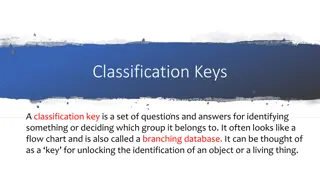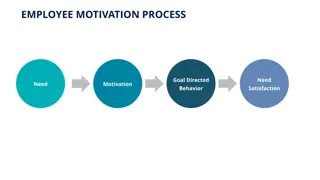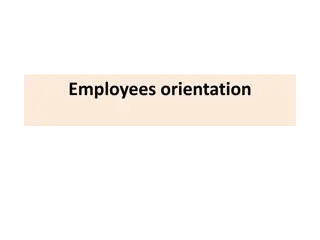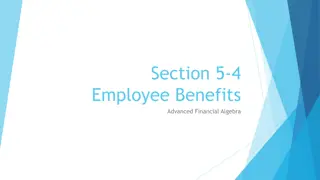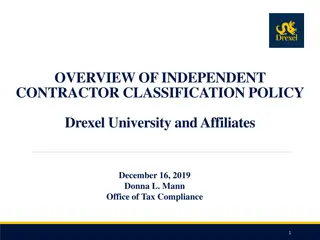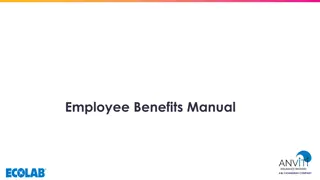Understanding Contractor vs Employee Classification in Business
When engaging contractors, it's crucial to assess if they could be deemed employees to avoid legal and financial implications. Obligations such as super guarantee payments, Workcover, and Payroll Tax apply if contractors are classified as employees. Proper classification between employees and contractors is essential for compliance and business operations.
Download Presentation

Please find below an Image/Link to download the presentation.
The content on the website is provided AS IS for your information and personal use only. It may not be sold, licensed, or shared on other websites without obtaining consent from the author. Download presentation by click this link. If you encounter any issues during the download, it is possible that the publisher has removed the file from their server.
E N D
Presentation Transcript
Presentation: Is your contractor an employee? Presenter: Mitch Williams
ABOUT US ABOUT ME Our practice commenced in Mossman in 1933 and has been servicing the region now for 90 years. I have been in Public Practice for close to 15 years and been working in Port Douglas for 7 of those. We have 12 staff members between our 2 offices and our offer a full suite of accounting services. My passion is providing advice to our business clients which is practical and timely to ensure they feel highly We now also offer finance broking for all lending purposes supported.
Yes, a contractor can be a deemed employee It is a common misconception that when you engage contractors, it is a much simpler arrangement which simply requires the contractor to get an ABN, provide an invoice and then your business can wash its hands of any further responsibility. In fact, it is quite the opposite. You now need to complete an assessment of the contractor arrangement to determine if you are still responsible for a wide range of EMPLOYMENT related obligations. Some cases are clear cut, but many are not (quite often they are complex and unclear) and the implications of failing to treat your contractors correctly for matters such as Super, Workcover and Payroll Tax can be severe. This is not to mention the employee entitlements they could be entitled to under the National Employment Standards.
Implications if a deemed employee Super Guarantee Where a contractor is a deemed employee, super guarantee must be paid. Failure to do can result in significant interest and penalties Workcover Where a contractor is a deemed employee, they must be covered under your own Workcover policy Payroll Tax Where a contractor is a deemed employee, they will be counted towards your total taxable payments Taxable Payments Annual Reporting Need to complete a Taxable Payments Annual Report each year with the ATO if in certain industries including construction, cleaning, freight services, IT and security.
Classifying Your Workers ATO Apprentices Always an Employee Trainees Labourers Trades Assistant Companies Always a Contractor Trusts Partnerships
Classifying Your Workers ATO Serving in your Business The critical differences between an employee and independent contractor are: an employee serves in your business, and performs their work as a representative of your business an independent contractor provides services to your business and performs work to further their own business. It is crucial that you accurately characterise the nature of the business that you carry out. You should examine the essential activities of the business that you operate and compare them with the legal rights and obligations contained in the contract you entered into with the worker. Although the old multifactorial test is no longer used, the same indicia are still relevant in considering whether the worker is working in your business, taking into account only the legal rights and obligations between you and your worker.
Classifying Your Workers ATO Contractor Indicia Employee Worker cannot subcontract or delegate work Ability to Delegate Worker can subcontract/delegate work Worker is paid for a result achieved based on the quote they provide Worker is paid on a time worked (hourly), price per item/activity or commission basis Basis of Payment Worker provides all/most of the equipment used Business provides all/most of the equipment used Equipment, Tools & Other Assets No commercial risk for the worker. Business is legally responsible Worker takes commercial risks being responsible for their work and cost to rectify Commercial Risk Business has the right to direct how/when the worker does work Worker has freedom in the way the work is done, subject to contract/agreement Control Over Work Workers operates their own business independently Independence Worker not operating their business independently. Considered part of your business
Myths & Facts Myth Fact If a worker has an ABN they're a contractor Having an ABN makes no difference to whether a worker is an employee or contractor for a job. Everyone in my industry takes on workers as contractors, so my business should too Just because other businesses treat workers as contractors doesn't mean they have got it right. Employees can't be used for short jobs or to get extra work done during busy periods The length of a job or regularity of work makes no difference to whether a worker is an employee or contractor. A worker cannot work more than 80% of their time for one business if they want to be considered a contractor The 80% rule, or 80/20 rule as it is sometimes called, relates to personal services income (PSI) My business has always used contractors, so we don't need to check whether new workers are employees or contractors Before hiring a new worker, you should always check whether the worker is an employee or contractor by examining the working arrangement
Myths & Facts Myth Fact My business should only take on contractors so we don't have to worry about super Businesses may be required to pay super for their contractors. If you pay an individual contractor under a contract that is wholly or principally for the person's labour, you have to pay super contributions for them Just because a worker has a preference to work as a contractor doesn't mean your business can engage them as a contractor Submitting an invoice for work done or being 'paid on invoice' doesn't make a worker a contractor My worker wants to be a contractor, so my business should treat them as one If a worker submits an invoice for their work, they're a contractor If a worker's contract has a section that says they are a contractor, then legally they're a contractor If a worker is legally an employee, a contract saying the worker is a contractor will not make the worker a contractor at law Having a registered business name makes no difference to whether a worker is an employee or contractor. If a worker has a registered business name, they're a contractor


